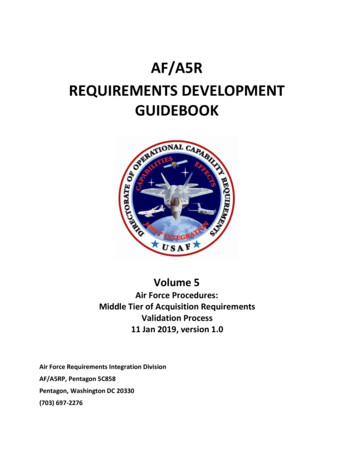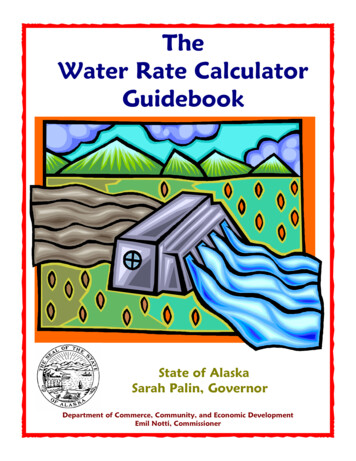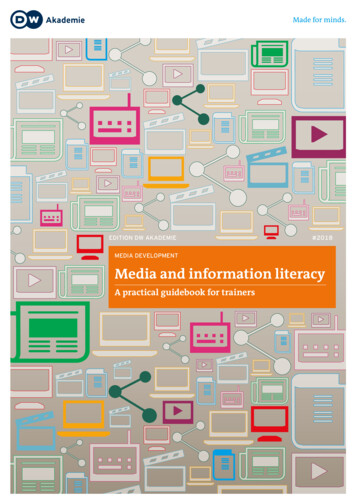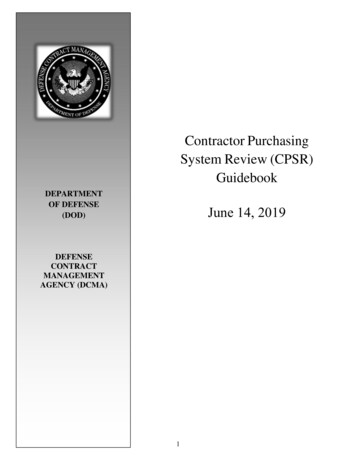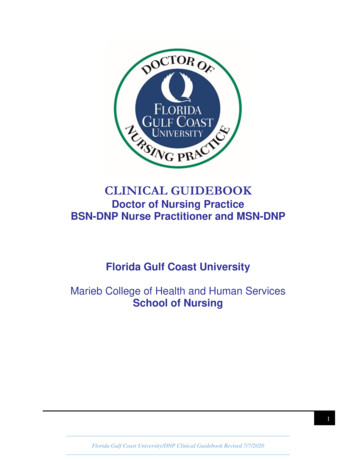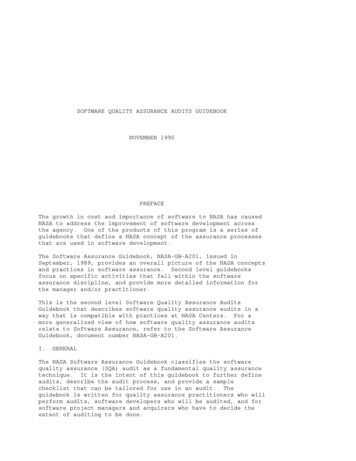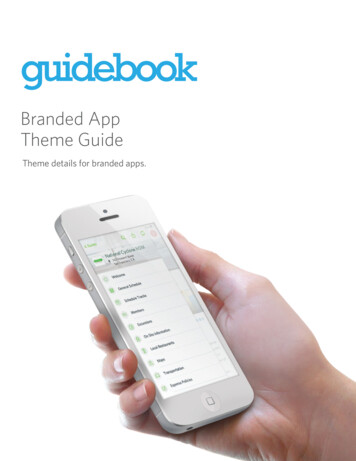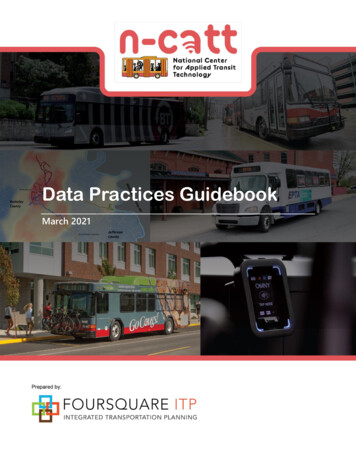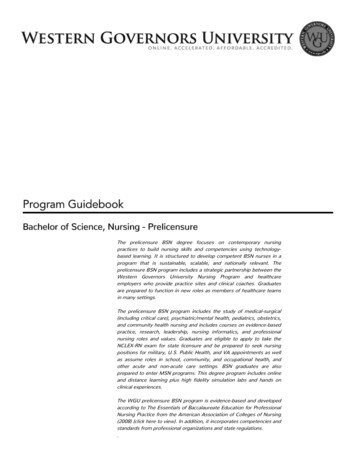
Transcription
Program GuidebookBachelor of Science, Nursing - PrelicensureThe prelicensure BSN degree focuses on contemporary nursingpractices to build nursing skills and competencies using technologybased learning. It is structured to develop competent BSN nurses in aprogram that is sustainable, scalable, and nationally relevant. Theprelicensure BSN program includes a strategic partnership between theWestern Governors University Nursing Program and healthcareemployers who provide practice sites and clinical coaches. Graduatesare prepared to function in new roles as members of healthcare teamsin many settings.The prelicensure BSN program includes the study of medical-surgical(including critical care), psychiatric/mental health, pediatrics, obstetrics,and community health nursing and includes courses on evidence-basedpractice, research, leadership, nursing informatics, and professionalnursing roles and values. Graduates are eligible to apply to take theNCLEX-RN exam for state licensure and be prepared to seek nursingpositions for military, U.S. Public Health, and VA appointments as wellas assume roles in school, community, and occupational health, andother acute and non-acute care settings. BSN graduates are alsoprepared to enter MSN programs. This degree program includes onlineand distance learning plus high fidelity simulation labs and hands onclinical experiences.The WGU prelicensure BSN program is evidence-based and developedaccording to The Essentials of Baccalaureate Education for ProfessionalNursing Practice from the American Association of Colleges of Nursing(2008) (click here to view). In addition, it incorporates competencies andstandards from professional organizations and state regulations.
Mission of the WGU Department of NursingThe mission of the Department of Nursing is to make a positive difference in the lives of our studentsand the practice of nursing through a professionally supported, competency-based and studentfocused learning model for working adults that promotes success in educational goals and sustainedprofessional commitment. The Department of Nursing is committed to the formation of confident,caring, and competent professional nurses prepared to meet emerging healthcare needs of diversepopulations.Departmental PromiseThe WGU Department of Nursing promises to help our students develop the cognitive knowledge,ethical comportment, and clinical reasoning skills required of a professional nurse so that they maybecome safe, competent practitioners. We will: Embrace diversityCommit to individual student success Support on-time progression and graduation Treat students in a fair and equitable manner Ensure individualized response to student needs Communicate respectfully and in a timely manner Advocate for the students through all aspects of the learning experience Collaborate with national and community leaders in academia and industry Be accountable for the quality and integrity of the nursing education programs Provide relevant and innovative educational resources delivered when and where neededNursing Programs PhilosophyWe envision nursing as a caring interaction between the nurse, who is a member of an interdisciplinaryteam, and the patient, who is a member of a family and community. This caring interaction occursacross the lifespan, from infancy through old age. Nurses identify and strengthen clients' potential tomove toward health and help clients shape their environment to promote well-being. We believe thathealthcare begins in the community, prior to diagnosis of illness, by promoting health and wellnessthrough advocacy, community assessment, and preventative care. Nurses use appropriate technologiesand current evidence to develop their plans of care, whether in the community, the clinic, an acute carefacility, or an extended care facility. Nurses assume leadership for clinical and ethical decision-making.We believe that the global nature of communities and healthcare delivery necessitates that nurses beable to engage with patients, families, and communities who have diverse ways of responding to theirhealthcare needs. We recognize that the definition of family has expanded to include a variety ofdifferent compositions and roles and is the fundamental vehicle for how clients are supported, interactwith the world around them, access resources, and engage in healthcare.We recognize that students, particularly adult learners, have preferred learning styles, bring previousexperience to the learning environment, and develop competency at different paces.BSRN BSPRN 201611 2019 Western Governors University2
Learners seek to make sense of new educational experiences in light of their past and existingknowledge and then apply their new findings to real situations. Therefore, nursing education shouldprovide opportunities where students engage in real world application to demonstrate competency incognitive knowledge, clinical reasoning, and ethical comportment.BSN Program GoalsAt the completion of the BSN program, graduates will be able to: Provide compassionate, patient-centered care to individuals, families, and communities from avariety of cultures across the lifespan. Apply leadership skills to engage others in creating, promoting, and managing a healingenvironment. Use clinical reasoning to provide safe, quality nursing care based on the best available evidenceand ethical principles. Use information technology to communicate, mitigate error, and make decisions related to theprovision of patient care. Support incorporation of nursing knowledge in the development ofpatient care technology. Assume accountability for providing and ensuring safe, efficient, quality care congruent withethical, professional, and legal standards. Engage in interprofessional collaboration to improve safety and quality of healthcare. Incorporate knowledge of genetics and genomics into the care of patients, families, andcommunities. Assume accountability for providing and ensuring safe, efficient, quality care congruent withethical, professional, and legal standards. Apply leadership skills to engage others in creating, promoting, and managing a healingenvironment.Understanding the Competency-Based ApproachPractically speaking, what does it mean when we say that WGU programs are competency- based?Unlike traditional universities, WGU does not award degrees based on credit hours or on a certainset of required courses. Instead, students earn their degrees by demonstrating their skills,knowledge, and understanding of important concepts through a series of carefully designedassessments.Progress through your degree program is governed, not by classes, but by satisfactory completionof the required assessments that demonstrate your mastery of the competencies. Of course, youwill need to engage in learning experiences as you brush up on competencies or developknowledge and skills in areas in which you may be weak. For this learning and development, WGUhas a rich array of learning resources in which you may engage under the direction of your mentor.You will work closely with your mentor to schedule your program for completing the assessments.(We discuss assessments in much more detail later in this guide.) You will work closely withadditional faculty members as you proceed through courses that are designed to lead you throughthe content you must master in order to pass individual assessments.BSRN BSPRN 201611 2019 Western Governors University3
The benefit of this competency-based system is that it makes it possible for people who areknowledgeable about a particular subject to make accelerated progress toward completing non- clinicalcourses. You may have gained your skills and knowledge of a subject on the job, accumulated wisdomthrough years of life experience, or, indeed, took a course on a particular subject. WGU awards adegree to you based on the skills and knowledge that you possess and can demonstrate, not thenumber of credits you have on your transcript.AccreditationWestern Governors University is the only university in the history of American higher education to haveearned accreditation from four regional accrediting commissions. WGU's accreditation was awarded by(1) the Northwest Commission on Colleges and Universities, (2) the Higher Learning Commission of theNorth Central Association of Colleges and Schools, (3) the Accrediting Commission for Community andJunior Colleges of the Western Association of Schools and Colleges, and (4) the AccreditingCommission for Senior Colleges and Universities of the Western Association of Schools and Colleges.The university's accreditation status is now managed by the Northwest Commission on Colleges andUniversities (NWCCU). The WGU Teachers College is accredited by the National Council forAccreditation of Teacher Education (NCATE). The nursing programs are accredited by the Commissionon Collegiate Nursing Education (CCNE). The Health Informatics program is accredited by theCommission on Accreditation for Health Informatics and Information Management Education (CAHIIM).WGU's Mentoring ApproachOur mentoring approach is a powerful component of the WGU educational experience. When youenroll at WGU, you will begin interacting with the mentors assigned to provide guidance through theterms and courses. Mentors take an active role and a personal interest in student success andprogress. Whether by email or phone, mentors are the essential "point person" for communicationthroughout the program. The mentor will help motivate you to work hard to complete your program.When a student has questions or concerns, the mentor team will help to resolve them.You and your mentor work together to help determine which areas the student should focus on todevelop a personalized Degree Plan. The prelicensure program has a strictly defined set of courses,schedule, and a progression plan which students must follow. This plan has been established throughthe requirements of and approval by state boards of nursing. Students are assigned to a cohort andmust stay on time and on track to remain in their cohort and graduate with their cohort. Each clinicalcourse has corequisites. This means that the theory course, clinical lab (learning labs and clinicalsimulation labs), and clinical course all must be taken together. If a student is not able to fulfill thepassing requirements for one of the three for a given course, they must repeat all three.BSRN BSPRN 201611 2019 Western Governors University4
Admission RequirementsTerm One EnrollmentThe WGU prelicensure BSN program contains the equivalent of two years of upper division nursingcourses. Prior to being enrolled into term one curriculum, students must have completed allprerequisite science and general education courses required for a baccalaureate degree in nursing.Students may transfer the credits from a regionally accredited institution of higher learning. Studentsmust submit official, sealed transcripts of all academic work to WGU on or before the first of the monthprior to the start date of the program. Transcript evaluation guidelines may indicate a timeframe forcompletion of some prerequisite courses in order for them to be accepted for transfer credit and toqualify for admission.Term One Enrollment RequirementsApplicants must have a minimum of a 2.5 GPA in the required nursing sciences to be considered forenrollment into the nursing program. Successful completion of a nursing program admission exam isrequired prior to enrollment. Enrollment in the University and in the Term One term does notguarantee acceptance into the clinical nursing program.*CA students will progress to Term 2 provided all Term 1 requirements have been satisfied.In order to be considered for enrollment into the Term One term, applicants are required to submitand/or complete the following items:1. Official Transcripts from all previously attended colleges and universities that show completionof required prerequisites;2. Letter of intent – Student Statement;3. Professional resume;4. Letter of Recommendation;5. Take and pass the ATI TEAS Exam at the "Proficient," "Advanced," or "Exemplary" Level. Clickhere to learn more about the ATI TEAS Exam: The ATI TEAS Nursing ExamApplicants who are not native speakers of English or non-U.S. born applicants who have notcompleted college level prerequisite courses in a U.S accredited college or university are required totake appropriate tests of language proficiency.Prelicensure Clinical Nursing Program Admission Requirements:Enrollment into the term one curriculum and admission into the Clinical Nursing Program iscompetitive. Students must first be accepted and enrolled into term one. Students who are successfulin term one will be allowed to apply for admission for the Clinical Nursing Program. Enrollment in thePre-Nursing Curriculum is not a guarantee for admission into the Clinical Nursing Program. You must beat least 18 years of age before beginning the application process or participating in clinical experiences.Students enrolled in the Pre-Nursing Curriculum must successfully pass the Foundations in NursingSkills performance exam (click here to view) during the pre-nursing term in order to be considered foradmission.BSRN BSPRN 201611 2019 Western Governors University5
Approximately 60 days after enrollment into the Pre-Nursing Curriculum, if you qualify, you must applyfor admission into the Clinical Nursing Program. To be considered for admission, the following supportdocumentation must be provided by you as part of the application process:Proof of health insurance†.Proof of successfully passing a criminal background check*.Proof of successfully passing a urine drug test*.Proof of a current immunization record and current negative TB test.Click here to see whatimmunizations are required of you Proof of meeting the specific physical requirements in accordance with the core performancestandards of the nursing profession. Click here to see examples of physical requirements Participation in an interview with an admissions committee comprised of two or three committeemembers including the State Director of Nursing or designee. † Note: Student malpractice insurance will be provided by WGU at no cost to you.*Note: Starred items are required to be completed no sooner than 90 days prior to beginning theclinical portions of this program.Application and acceptance into the program is based on available clinical space, successful completionof all pre-nursing term course requirements, and numerical ranking of the above items, including aWGU pre-nursing term mentor recommendation.*CA students will progress to Term 2 provided all Term 1 requirements have been satisfied.Essential Performance StandardsBackground: The Americans with Disabilities Act (ADA) of 1990 was instituted by Congress to prohibitdiscrimination against qualified individuals with disabilities. The ADA defines a qualified individual witha disability as an individual with a disability who, with or without reasonable accommodation, canperform the essential functions of the employment position that such individual holds or desires. Inaddition, the Rehabilitation Act of 1973 prohibits discrimination in admissions of a qualified personwith disabilities.ADA and the Rehabilitation Act of 1973 eligibility requirements vary depending on the type of services,activities, and functions needed in particular areas. Because the practice of nursing is an applieddiscipline with cognitive, sensory, affective, and motor components, students must be able to performthe functions which are necessary for the safe practice of nursing and essential to the licensingrequirements for nursing. Students must be capable of meeting the following essential performancestandards with or without reasonable accommodations in order to be admitted to the WGUPrelicensure nursing program:The Performance Standards Ability to think critically and focus on patient care priorities in order to make clinical decisions,identify cause-and-effect relationships with clinical data, and develop nursing care plans.BSRN BSPRN 201611 2019 Western Governors University6
Ability to demonstrate interpersonal abilities in order to interact appropriately with individuals,families, and groups from a variety of social, emotional, cultural, and intellectual backgrounds. Ability to clearly communicate in English (both verbal and written forms) in order to communicate nursing actions, interpret client responses, initiate health teaching, document and understandnursing activities, and interact with clients, staff, and faculty supervisors.Ability to maneuver in small spaces and move from one place to another in order to move aroundin clients' rooms and bathrooms, into and out of work spaces, access treatment areas, andprocure needed emergency materials when indicated. While healthcare agencies must meet ADAphysical access standards, potential clients and equipment may limit the amount of availablespace in which to move.Ability to demonstrate gross and fine motor skills sufficient to provide safe and effective nursingcare in order to move and position clients in and out of bed, calibrate and use equipment, andperform patient care procedures such as IV insertion and cardiopulmonary resuscitation.Ability to successfully perform the following physical activities:o Walk 5 miles per dayo Lift 50 poundso Reach above shoulder levelo Bend and stoop/squato Grasp/gripo Ascend and descend stairsAbility to hear well enough to monitor and assess client's health needs in order to hear cries forhelp, alarms on equipment, emergency signals, breath and heart sounds on auscultation, andvarious overhead announcements and cues.Ability to distinguish colors and see well enough to observe and assess clients' health status andchanges in condition in order to see grimacing, movement, changes in skin color, rashes, andother observed client changes or responses.Ability to have tactile capabilities sufficient for physical assessment such that the student cansuccessfully perform palpation, note changes in skin temperature, perform skills related totherapeutic activities, and identify by touch other changes in client condition.Physical and mental stamina necessary to adapt to requirements of 12-hour shift work, including:o Rotations on the 24-hour clocko Ability to sit for long periods of timeo Ability to stand for long periods of timeThe procedure for requesting ADA accommodations is located on the University portal here.Connecting with Other Mentors and Fellow StudentsAs you proceed through your Degree Plan, you may also have direct contact with other facultymembers. These communications can take a variety of forms, including participation in learningcommunities, office hours via the courses, and webinars. As a WGU student, you will have access toyour own personal MyWGU Student Portal that will provide a gateway to courses, learningcommunities, and program communities where you will have interactions with faculty and otherstudents. Courses of study and communities are specifically designed to support you as you developcompetencies in preparation for your assessments through the utilization of threaded discussions,blogs, and chats that are guided by content experts. You will access your program community duringthe orientation to network with peers who are enrolled in your program and to receive continuedsupport through professional enrichment and program- specific chats, blogs, and discussions. WGUalso provides a Student Services Associate to help you and your mentor solve any special problemsthat may arise.BSRN BSPRN 201611 2019 Western Governors University 5/6/197
OrientationThe orientation focuses on acquainting the student with WGU's competency-based model, distanceeducation, technology, and other resources and tools available for students. You will also utilizetutorials, message boards, online chats, and other activities to connect with other students in yourprogram. This orientation is completed before you start your first term at WGU.Transferability of Prior College CourseworkBecause WGU is a competency-based institution, it does not award degrees based on credits buton demonstration of competency. However, if you have completed college coursework at anotheraccredited institution, you may have your transcripts evaluated and may be able to have somelower-division or corequisite assessments cleared. The guidelines for determining what will "clear"through transfer vary based on the degree program.The following transfer guidelines generally apply to undergraduate programs: Requirements in thedomains that can be considered the degree major cannot be cleared through transfer.Furthermore, WGU does not clear any requirements based on the student's professionalexperience and does not perform a "resume review" or "portfolio review" that will automaticallyclear any degree requirements. Degree requirements and transferability rules are subject tochange in order to keep the degree content relevant and current. To review more information inregards to transfer guidelines based on the different degree programs, you may visit the StudentHandbook found at the link below and search for "Transfer Credit Evaluation."Student HandbookRemember, WGU's competency-based approach lets you take advantage of your knowledge andskills, regardless of how you obtained them. Even when you do not directly receive credit, theknowledge you possess may help you accelerate the time it takes to complete non clinical courses.Continuous Enrollment, On-Time Progress, and SatisfactoryAcademic ProgressWGU is a "continuous enrollment" institution, which means you will be automatically enrolled ineach of your new terms while you are at WGU. Your terms are six months long. Longer termsand continuous enrollment allow you to focus on your studies without the hassle of unnaturalbreaks between the shorter terms that you would experience in a more traditional environment.At the end of every six-month term, you and your mentor will review the progress you havemade and revise your Degree Plan for your next six-month term.WGU requires that students make measurable progress toward the completion of their degreeprograms every term. We call this On-Time Progress (OTP), denoting that you are on track andmaking progress toward on-time graduation. As full-time students, graduate students mustenroll in at least eight (8) competency units each term, and undergraduate students must enrollin at least twelve (12) competency units each term. Completing at least these minimumenrollments is essential to On-Time Progress and serves as a baseline from which you mayaccelerate your program.BSRN BSPRN 201611 2019 Western Governors University 5/6/198
We measure your progress based on the assessments you are able to pass, not on youraccumulation of credit hours or course grades. Every time you pass an assessment, you aredemonstrating that you have mastered skills and knowledge in your degree program. Forcomparison to traditional grading systems, passing an assessment means you havedemonstrated competency equivalent to a "B" grade or better.WGU has assigned competency units to each assessment so that we can track your progressthrough the program. A competency unit is equivalent to one semester credit of learning.Some assessments may be assigned three competency units while other assessments may beas large as six competency units.Satisfactory Academic Progress (SAP) is particularly important for financial aid studentsbecause you must make SAP in order to maintain eligibility for financial aid. We will measureyour SAP quantitatively by reviewing the number of competency units you have completedeach term. As full-time students, WGU graduate students must enroll in at least eightcompetency units each term, and undergraduate students must enroll in at least 12competency units each term. In order to remain in good academic standing, you mustcomplete at least 66.67% of theunits you attempt—including any assessments you add to your term to accelerate yourprogress. Additionally, during your first term at WGU you must pass at least three competencyunits in order to remain eligible for financial aid. We know that SAP is complex, so pleasecontact a Financial Aid Counselor should you have additional questions.AssessmentsYour Degree Plan will include the assessments needed to complete your program. To obtainyour degree you will be required to demonstrate your skills and knowledge by completing thefollowing assessments:Performance Assessments contain, in most cases, multiple scored tasks such as projects,essays, and research papers. Performance assessments contain detailed instructions and rubricsfor completing each task and are submitted in Taskstream, an online project management andgrading tool.Objective Assessments are designed to evaluate your knowledge and skills in a domain ofknowledge. Most objective assessments include multiple-choice items, multiple-selection items,matching, short answer, drag-and-drop, and point-and-click item types, as well as case studyand video-based items.Learning Lab and Simulations are designed to evaluate your knowledge and skills related topatient care in simulated clinical environments. Lab and simulation assessments are conductedby learning lab instructors.Clinical Intensives are designed to evaluate clinical performance in actual clinical settingsaccording to nine key behaviors. Clinical Instructors complete clinical assessments.As previously mentioned, we have assigned competency units (CUs) to each assessment inorder to measure your academic progress. A standard plan for the program for a student whohas no transfer units would look similar to the one below.BSRN BSPRN 201611 2019 Western Governors University 5/6/199
The prelicensure nursing program is a sequential program, meaning you must complete theclinical courses in a specific order. For example, you cannot work on Caring Arts and ScienceAcross the Lifespan (known as CASAL II) until you have successfully completed therequirements of CASAL I, which includes required assignments, assessments, clinical learninglabs, and a clinical intensive.The standard path below lists the required competencies. Prelicensure students must havecompleted all liberal arts and science prerequisites prior to being considered for admissioninto the nursing program.Standard PathCourses indicated as “TR” above must be completed outside of WGU and accepted fortransfer credit before enrolling in this program. The pre- nursing curriculum (indicated above as“Pre”) is one-term of courses that must be completed successfully in order to be eligible foradmission consideration into the nursing program. The clinical portion of the nursing programis designed to be completed in four terms. Program completion may take longer dependingupon on time progression through the clinical degree requirements. The Degree Plan willinclude greater detail about the courses, including the assessments and their associatedstandard learning resources. The last term, particularly the last three months of the term,requires almost a full- time commitment since it includes 180 hours of clinical time plus acomprehensive NCLEX review for the licensing exam. Students are advised to begin preparingand saving for the last term from the beginning of the program.BSRN BSPRN 201611 2019 Western Governors University 5/6/1910
General ExpectationsThe study of nursing is a very challenging endeavor requiring competencies in cognitiveknowledge related to nursing practices and clinical reasoning in the delivery of patient care. Weare committed to assisting you to achieve these competencies in your journey toward becominga professional nurse dedicated to providing safe, high quality nursing care.Your mentors, directors, and staff at WGU expect that you will demonstrate professionalconduct and behaviors in both clinical and non-clinical settings. You are therefore expected tolearn and adhere to professional standards of practice; be aware of your own personal valuesand show respect for others regardless of differing values and opinions.We also hold for ourselves a parallel expectation that you will be provided the resourcesnecessary for the achievement of the nursing program competencies. You can expect us to treatyou with respect and dignity. We know when your dignity is affirmed, the learning environmentwill be conducive for the best learning outcomes, and you are more likely to affirmBSRN BSPRN 201611 2019 Western Governors University 5/6/1911
the dignity of patients entrusted to your care, as well as the dignity of colleagues with whomyou practice.Clear, effective, and appropriate communication with patients and families as well as peers,mentors, professional healthcare members, and others is an important component ofprofessional demeanor and behaviors. Students are expected to demonstrate integrity, honesty,a caring attitude, and a respectful approach in interactions with others. Students must embracethe values essential to the profession of nursing, work in collaboration with othersand commit to being prepared physically, emotionally, and academically in the clinical setting.Your WGU Nursing Student Handbook provides specific guidance on policies related toprofessional nursing behaviors in addition to policies and procedures about admission andprogression. You are expected to read and understand policies relevant to the University and thenursing program. You will be held responsible and accountable for the information in thehandbook.You are expected to be self-directed and take an active role in your learning. Expect to spend aminimum of 25–30 hours per week completing assignments and activities related to your course;the weekly time requirements will increase to 35–40 hours during Term 4 and may requireadjustment to your work schedule. This requirement is described in further details below
practice, research, leadership, nursing informatics, and professional nursing roles and values. Graduates are eligible to apply to take the NCLEX-RN exam for state licensure and be prepared to seek nursing positions for military, U.S. Public Health, and VA appointments as well as assume roles in school, community, and occupational health, and
